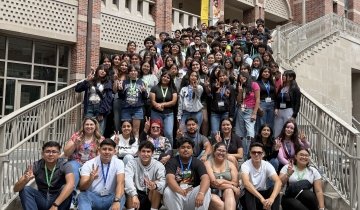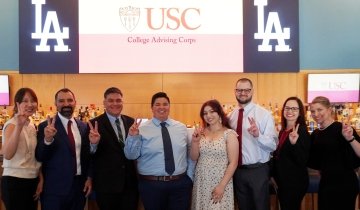[This essay is adapted from “Reclaiming Racial Justice in Equity,” which originally appeared in Change: The Magazine of Higher Learning.]
As we celebrate the 100th anniversary of our School of Education, I feel very honored to be a part of its illustrious history. Twenty years ago, I founded the Center for Urban Education (CUE) as an organization meant to attack the deeply entrenched problem of racial inequity. Though I had the full support of USC, the equity message was not very widely accepted at the time in education. Here in 2018, thankfully, equity has finally entered the dominant discourse of higher education—I see the word used everywhere now.
Once viewed suspiciously and associated with the activism of social justice movements that academic purists disdain as “advocacy” work, equity is now being embraced.
After pushing so long for recognition of the concept, and as someone credited for inventing the term “equity-minded,” you would think I'd be thrilled by the degree to which the term has become ubiquitous.
But I find my excitement quelled. This embrace of equity is happening without a genuine understanding by many of what the concept is. While people such as myself and USC Rossier’s Shaun Harper could be considered “equity leaders,” there are very few of us, and I believe this has helped lead to the proliferation of this term representing an appropriation and dilution of equity.
Many are familiar with CUE's mission to support institutional efforts to attain equity in educational outcomes for racially minoritized students. But many do not know that equity has a very distinct meaning, rooted in achieving racial proportionality in all educational outcomes. At its core, it is about acknowledging and addressing racism in our educational systems.
For equity to fulfill its promise in the future, I want to reclaim the racial justice focus that is the rightful meaning and intent of equity while helping to expand the number of leaders committed to making racial equity a priority. I used the word “reclaim,” borrowing it from the phrase “reclaiming my time” that U.S. Representative Maxine Waters invoked last year to resist being silenced by U.S. Treasury Secretary Steven Mnuchin’s diversionary tactics to run out the clock and not have to answer her questions on President Trump’s financial ties to Russia. Representative Waters resisted silencing by a powerful white man, and her phrase “reclaiming my time” went viral. In the same spirit, I would like to confront the whitewashing of equity and reclaim the use of the word with fidelity to its anti-racist roots.
I feel it necessary to do this so that the word and the concept remain meaningful now and in the future. Equity is much more than a word to be sprinkled into educational discourse like one might sprinkle salt to give seasoning to a bland meal. To meaningfully and intelligently talk about equity and equity-mindedness, we must be clear about these words and our intentions.
Experience has taught me that equity-mindedness does not come naturally or easily. It requires a knowledge base. It takes a lot of practice. It needs leaders. And it must work from a consistent and clear definition.
So let me be clear: Equity and equity-mindedness accept that it is whiteness—not the achievement gap—that produces and sustains racial inequality in higher education. The total omission of race and whiteness in national higher education reforms is a direct threat to equity, eroding its racial justice agenda.
Beyond a renewed understanding of the word, we need leaders who know that racial equity is an indicator of knowledge, an indicator of quality, an indicator of advancement. We need leaders who can envision new, equity-minded approaches to solving problems and improving the lives of their faculty and students.
This means speaking out against the government's assault on immigrants, reassessing long-standing hiring practices from an equity perspective and correcting biases that have kept the playing field uneven for so long.
As I consider the future of education—as we must all do regularly, not just on significant anniversaries—I can only envision one where equity retains its core meaning and is a necessary element of higher education, as essential as enrollment, endowments and rankings.






